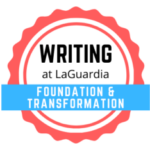-

Introduction to Academic Discourse for Students by Marisa A. Klages-Bombich
“Introducing Academic Discourse” by Marisa A. Klages-Bombich (Video)
|
-

Deceleration: 10-Minute Exercise–A Noteworthy Experience (Activity) by Lalit Bajaj
Directions: When you entered college, what was one noteworthy (important to you) experience you had? What did you learn from this experience? This experience doesn’t need to be big, but it does have to be an experience that taught you something. The experience can be as simple as meeting a fellow student or going to the…
|
-

Habits of Mind Homework (Activity) by Rochell Isaac
The Habits of Mind are an identified set of 16 problem solving, life related skills, necessary to effectively operate in society and promote strategic reasoning, insightfulness, perseverance, creativity and craftsmanship. The understanding and application of these 16 Habits of Mind serve to provide the individual with skills to work through real life situations that equip…
|
-

Habits of Mind Activity by Rochell Isaac
Habits of Mind Activity This activity might work as an ice breaker early in the semester. Provide students with an overview of a strength, then introduce students to Habits of Mind. You may also provide student with a visual chart. You can access a Habits of Mind Chart Here. According to CliftonStrengths (Gallup’s assessment tool to measure talent themes), “A strength…
|
-

Introduction to Multilingualism in College Composition for Students by Ting Man Tsao
“Introduction to Multilingualism in ENA and ENG 101” by Ting Man Tsao Letter of Welcome & Introduction to Multilingualism in ENA 101 by Ting Man Tsao Hi, How are you? 你好吗 Nǐ hǎo? 你好嗎? This is Dr. Tsao of the English Department. Welcome to our first composition class at LaGuardia! The LaGuardia community is linguistically…
|
-

Tips for Working Toward a Multilingual Paradigm by Ting Man Tsao
1) As Lucy, Joy, and Evelyn remind us, adopting a multilingual paradigm “involves a shift in perspective and a willingness to engage in learning ourselves.” So begin by trying out one or two low-stakes multilingual activities or assignments. As we gain more experience, add or modify more activities or assignments. Don’t overwhelm ourselves by overhauling…
|
-

Dictionary Exercises & Reflection by Ting Man Tsao
1) After reading the handout “Using Dictionaries for Writing,” look up this word “exploratory” in the Cambridge Dictionary. Try and use different options and features in the dictionary to find the following information of the word (put your answers below): ⭐ meanings: ⭐ examples of the use of the word: ⭐ translations in a language…
|
-

Working Towards a Multilingual Paradigm: Using Dictionaries for Writing* (Activity) by Ting Man Tsao
A dictionary is a very useful tool for writing. With a good dictionary you can do the following: 1) Look up the meaning of an English word. But a word often has more than one meaning so do not just look at the first definition in the dictionary entry. For example, the Cambridge Dictionary online…
|
-

Working Towards a Multilingual Paradigm: Attitudes Toward Language*(Activity) by Ting Man Tsao
1) Is it important to you to master your native language or dialect? Explain. 2) Should children master their parents’ native language? Explain. 3) If you are not a native English speaker, do you think your own native language and culture will help you develop your skills in English composition? Explain. 4) Is it important…
|


